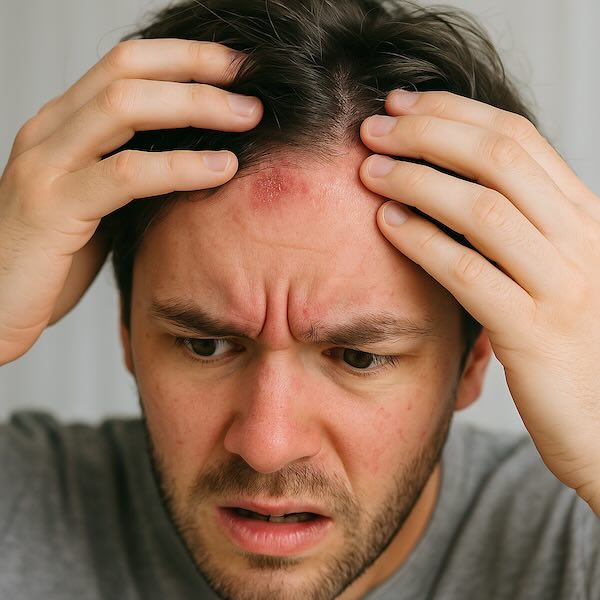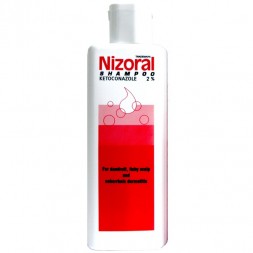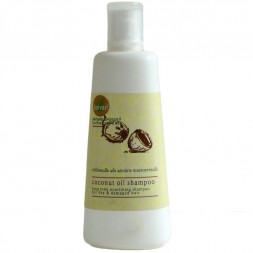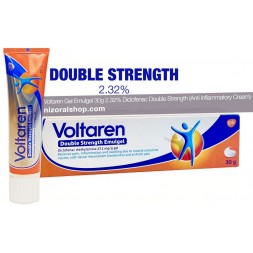
Your scalp feels itchy, flaky, and irritated. You’ve tried regular shampoos, conditioners, and even natural remedies—but nothing seems to work. If this sounds familiar, it might be time to consider ketoconazole shampoo, specifically Nizoral Shampoo 2%, which dermatologists recommend as one of the most effective solutions for persistent scalp conditions.
But how do you know if ketoconazole shampoo is the right choice? Here are five clear signs indicating it could significantly improve your scalp health:
1. Persistent Dandruff that Keeps Returning
Regular dandruff shampoos offer temporary relief by clearing visible flakes, but if your dandruff returns rapidly after you stop using them, you likely have a deeper fungal issue caused by an overgrowth of Malassezia yeast.
Persistent dandruff flakes are typically accompanied by itching and discomfort, often worsening when the scalp becomes oily or sweaty. Ketoconazole shampoo directly targets the underlying fungal growth responsible for these recurring symptoms, providing lasting relief where regular shampoos fail.
If you recognize persistent dandruff as your main problem, explore our effective Nizoral Shampoo 2% options for lasting results.
2. Intense Itching and Scalp Irritation
Everyone occasionally experiences mild scalp itchiness, but if your scalp feels persistently itchy to the point of discomfort, you might have a fungal infection rather than simple dryness or irritation. Itchiness caused by fungal scalp conditions often accompanies inflammation and redness and rarely subsides with ordinary shampoos.
Ketoconazole shampoo effectively treats the fungal overgrowth responsible for intense scalp itching. Regular use provides quick relief, significantly reducing discomfort and inflammation, and restoring your scalp’s natural balance.
3. Red, Inflamed, or Greasy Scalp Patches
Redness and inflammation, combined with greasy, yellowish flakes, strongly indicate seborrheic dermatitis, a common fungal condition. Seborrheic dermatitis is linked closely with fungal overgrowth, requiring an antifungal solution rather than traditional shampoos, which focus primarily on surface-level cleansing.
If your scalp is inflamed and has greasy, stuck-to-scalp flakes, switching to ketoconazole shampoo is a must. Ketoconazole reduces fungal presence, calming inflammation and gradually restoring a healthy scalp environment.
For additional relief, consider complementing your shampoo routine with Nizoral Cream to address especially persistent or localized patches.
4. Sudden Hair Thinning or Patchy Hair Loss
Fungal scalp infections like tinea capitis can lead to noticeable hair thinning or even patchy hair loss. If your hair suddenly seems thinner or you're noticing more hair shedding alongside other fungal symptoms (redness, irritation, greasy flakes), this strongly signals the need for antifungal treatment.
Ketoconazole shampoo not only addresses underlying fungal infections causing hair issues but also creates a healthier scalp environment, allowing your hair to regrow naturally and healthily over time.
Remember, early intervention can help prevent permanent damage—consult a dermatologist immediately if hair loss symptoms persist despite treatment.
5. Ineffective Results from Standard Anti-Dandruff Shampoos
If you've consistently used traditional anti-dandruff shampoos without lasting improvement, it’s time to rethink your treatment strategy. Many anti-dandruff shampoos focus solely on removing flakes, ignoring the underlying fungal issue at the root of persistent dandruff or scalp irritation.
Ketoconazole shampoo, particularly Nizoral Shampoo 2%, differs from standard options by directly attacking the fungus causing your scalp problems. If regular shampoos have consistently disappointed you, ketoconazole shampoo offers a potent, clinically proven alternative.
How to Get the Best Results from Ketoconazole Shampoo
To maximize your treatment effectiveness, follow these practical tips:
-
Use consistently: Apply twice weekly initially, then reduce usage once symptoms improve.
-
Allow sufficient contact time: Always leave shampoo on your scalp for at least 3–5 minutes.
-
Rinse thoroughly: Ensure no residue remains after washing.
-
Pair with topical cream if necessary: For severe cases, use Nizoral Cream alongside the shampoo.
Additional Tips for Long-Term Scalp Health
Alongside ketoconazole shampoo, incorporate these helpful scalp-care practices into your routine:
-
Avoid harsh hair products containing alcohol or strong fragrances.
-
Wash hats, pillowcases, and combs regularly to reduce fungal exposure.
-
Practice stress management, as stress frequently exacerbates scalp conditions.
-
Maintain a balanced diet to support overall skin and scalp health.
When Should You Consult a Dermatologist?
While ketoconazole shampoo effectively manages most fungal scalp issues, persistent or severe symptoms require professional evaluation. Consult a dermatologist if you see no improvement after four weeks of regular ketoconazole shampoo usage, or if symptoms like hair loss, severe redness, or intense discomfort persist.
Recognize the Signs, Get Effective Relief
Don't settle for temporary relief from persistent scalp conditions. Recognizing these signs early and choosing ketoconazole shampoo as your primary treatment ensures lasting relief, improved scalp comfort, and healthier hair.
Explore our carefully selected Nizoral Shampoo collection today, and make persistent dandruff and scalp fungus a thing of the past.





